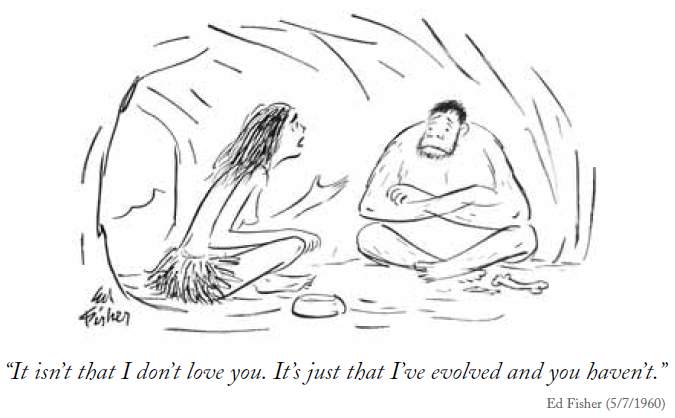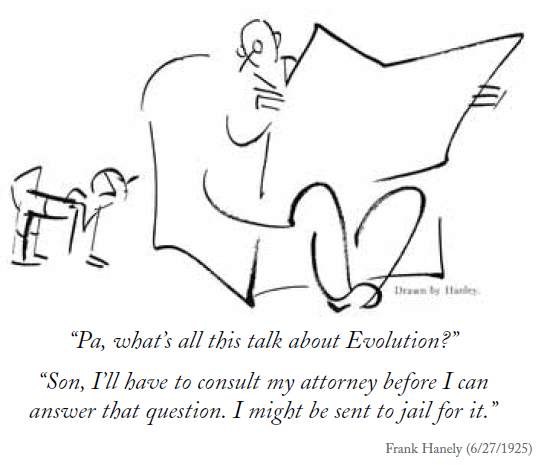Evolution
It is interesting to contemplate an entangled bank, clothed with many plants of many kinds, with birds singing on the bushes, with various insects flitting about, and with worms crawling through the damp earth, and to reflect that these elaborately constructed forms, so different from each other, and dependent on each other in so complex a manner, have all been produced by laws acting around us... Thus, from the war of nature, from famine and death, the most exalted object we are capable of conceiving, namely the production of higher animals, directly follows. There is a grandeur in this view of life.[23]
Evolution is the way plants and animals change their design if their environment changes or if another plant or animal begins to compete with them for food or territory or when they benefit from an accidental change in their DNA that gives them an advantage over others.
Three conditions are necessary and sufficient for evolution. They are inheritance (or replication), variation and selection. Any system that contains objects with these properties will display evolution. Because this self-perpetuation happens as a result of the way the Universe is (without any need for a plan or external driving force) some scientists have described things acting in this way as 'selfish replicators' (eg Richard Dawkins: 'The Selfish Gene').
It is possible to design a computer game in which objects have the properties of inheritance, variation and selection and then to set it going and watch them evolve. You can even buy one today that uses these rules.
Around one hundred thousand years ago the first modern humans appeared; probably in Africa. It took many millions of years for us to evolve and we have not changed a lot since that time.
We know this because various groups of humans were separated at about this time and some went south through Asia to Australia while some kept going all the way to South America and others to Europe and as far north as the arctic circle; yet we are less genetically different than almost any other species. An Eskimo or native Australian, European or Asian can, with the same amount of difficulty, become a pilot, brain surgeon or concert pianist (that is, a small proportion of us can, with a lot of study and application).

Similarly, all humans are excellent communicators; can learn to do very fine work with their hands (like needlework or watch making) and all have an advanced mechanical aptitude. Many nineteenth century examples exist of native people teaching themselves to read and write in English soon after being exposed to English speakers.
We can deduce from this that our common ancestors had already evolved the abilities needed to possess all these common skills over one hundred thousand years ago.
So why has it taken us so long to land a person on the Moon?
It is thought that Agriculture required systems land ownership and seasonal planning and this lead to other cultural developments like commerce, writing, specialisations and class structures, building substantial structures, cities and government.
Agriculture seems to have developed in several parts of the world quite independently. The earliest evidence of agriculture is around eleven thousand years ago in modern Iraq. There is also archaeological evidence of agriculture in China and New Guinea as long as nine thousand years ago while it may have been practiced in the Americas up to four thousand years ago[24].
As in New Guinea, agriculture may have developed in earlier times without writing, rulers and cities resulting.
About twenty thousand years ago the sea began to rise and by seven thousand years ago much of the low-lying land, on which early farms and even cities, may have existed was flooded.
Nevertheless, there is plenty of evidence hunting and gathering but no evidence of substantial structures (stone buildings, water irrigation canals, granaries, substantial storage systems etc) or writing, before eleven thousand years ago.
So we can conclude, with some certainty, that for the first sixty to ninety thousand years after leaving Africa, the predominant life style of humans on the planet was hunting and gathering; just as it was for native populations over most of the planet's area until 200 years ago.
We have acquired the ability to read and write; to analyse our environment; to construct complex systems and to organise socially; to create satellites and mobile phones; and to sequence a genome; in only the last ten thousand years. The change from hunting and gathering to 'advanced' civilisation is predominantly, perhaps entirely, a change in culture, the knowledge and ways each of us inherits from society, the things a child learns after their birth.
Indeed, the theory of evolution itself has been highly influential in the development of our culture; and controversial, particularly in the US. This is illustrated by this cartoon from The New Yorker in 1925:

Most of the technical skills and knowledge required are less than 500 years old. Many have been discovered during my lifetime (the structure of DNA, metal oxide and field effect transistors, integrated circuits, lasers, open heart and transplant surgery; a very long list) and many of the discoverers are still alive. So, again, what kept us? We could have been doing these things ninety thousand years ago.
Anthropologists have remarked that if it can be sustained in a comfortable climate, hunting and gathering is a better lifestyle than being a serf or industrial labourer; provided populations remain at a sustainable level or fall back to those levels during hard seasons. Hunter-gatherers typically work no more than 20 hours a week, have social structures that are essentially democratic and mutually supportive and life can be joyful. On the other hand life expectancy is low, physical injury and disease is common and a lot of time is spent brutally; killing for food and fighting others. It is documented that Australian Aborigines feared being forced to live like the Europeans (they were initially observing a penal colony) and consistently resisted early attempts to 'civilise' them.
Very likely the thing that triggered the first necessary steps to going to the Moon and decoding DNA was selective pressure. Selection, not applied to our genes but to our society; to our ways of doing things; to our ideas. It may be no accident that civilisation originated in areas where climate or the environment changed dramatically and has developed fastest in times of upheaval since; just as genetic development was dramatically altered and ultimately accelerated by past mass extinctions.
Clearly the developments that allowed us to send incredibly brave (or foolish) men to the Moon were cultural (the evolution of ideas) not genes. In recent times the very ideas themselves are causing rapid change and creating their own upheavals; in turn applying selective pressure to our ideas. Much of the rest of this essay is about these ideas.
A scientist, Richard Dawkins[25] first suggested the idea of the 'meme' that is very like the constructs talked about in postmodernism. The theory and study of memes is now growing all over the world[26]. Memes are said to be 'replicators' like genes. Copying someone else is a kind of replicator called a meme. Instead of messages on bits of DNA, memes are ideas, ways of doing things, fashions, mannerisms, stories, pictures, music etc that are copied or handed on from others.
When you copy someone you have replicated (inherited) his or her idea or behaviour. You may do this accurately or you may make some changes (variation) others may then copy you if they like the idea or behaviour. Otherwise they might take up a competing idea or behaviour (selection). An example of a meme is kids wearing their hats backwards. This competes with no-hat or hat-forwards or a different sort of hat style. It also goes along with other memes for that sort of person.
For a meme to have spread three other things need to have happened (just like for successful genes). It had to survive long enough to be copied, most of the copies had to be accurate and there needed be lots of copies made. This can happen because lots of copies are made each time (maybe an admired TV star dressed this way) or because it gets copied from one to another very quickly (maybe it is really easy to turn your hat around).
Some behaviour is not due to memes. Memes are copied ideas and behaviour. Things we found out by our own experience (the way most animals learn) or behaviour programmed by our genes, are not memes because they do not fulfil the requirements for a replicator. Of course others might copy behaviour first based on trial and error and it then becomes a meme.
Postmodernists talk about words as socially determined constructs. Words can also be seen as memes or parts of memes and they evolve. Each of us can make small changes or add new meanings to words. But these changes can't be so big that they seem nonsense to our listeners. Our listeners will try out these changes and if they find them useful they will hand them on to their listeners and so the word will evolve in society, just like animals and plants do in the environment. The way we do things can evolve in the same way.
Modern Biology holds that all life is perpetuated by the mindless struggle for survival by our genes. We seem to be the outcome of their survival strategies. If this is so, and if ideas work the same way, then ideas too may mindlessly seek to survive. Just as the richness of life seems to be the outcome of genes struggling to survive, so our ideas and culture may be nothing more than the expression of 'survival of the fittest' memes.
Like Genes, memes would succeed because they are good at multiplying not because they are in our interests or good for us. They are selfish. But we have to use the available memes to think and communicate and to find purpose and these ideas are the successful ones that have spread throughout our culture.
That ideas themselves are driving the process worries some people because if we ever make computers (or computer programs) that evolve without our aid, memes may find computers a better medium for their future survival and evolution. That would threaten our existence or make us the unwitting slaves of technology.
In any case humans, as we know us, probably have a very short life expectancy as a species with genes and memes at work changing us. The average lifetime of a species is somewhere between one and fifteen million years; depending on complexity and exposure to change.
Even without memes at work, mammal species are created and at a very high rate, compared to the average for other animals and plants. We have already been around for about 100,000 years. We might expect to die out or evolve into something else well before the next mass extinction[27].

